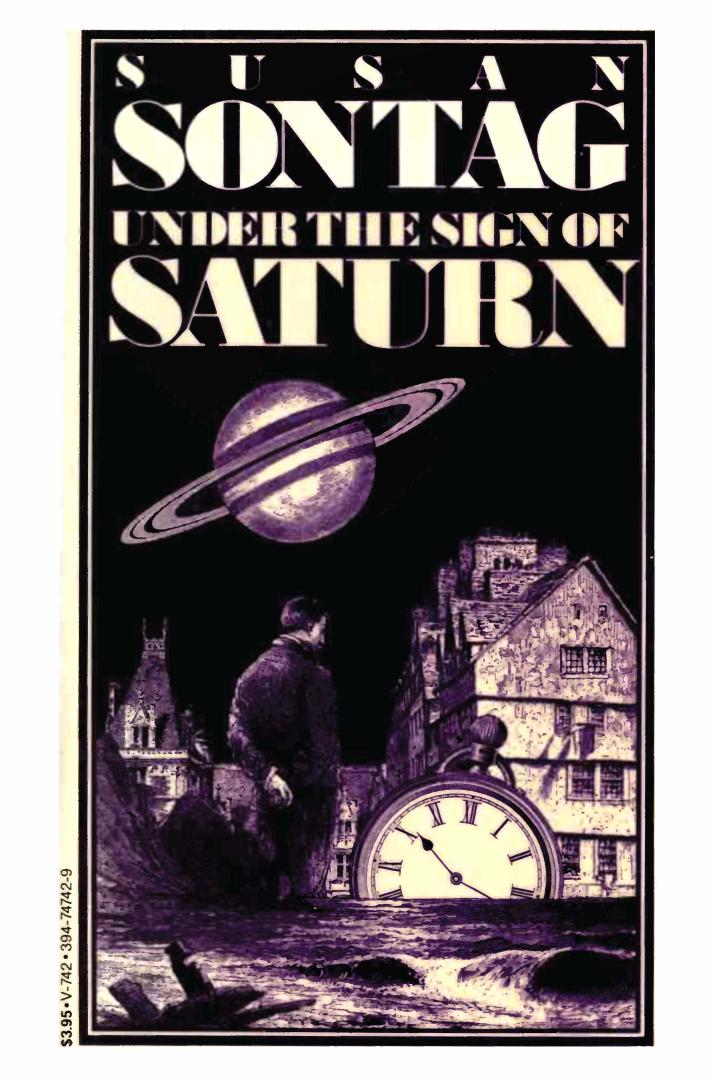Under the Sign of Saturn by Susan Sontag

Author:Susan Sontag
Language: eng
Format: epub, pdf
Publisher: Farrar, Straus and Giroux
Published: 2016-02-23T16:00:00+00:00
Under the Sign of Saturn
In most of the portrait photographs he is looking down, his right hand to his face. The earliest one I know shows him in 1927—he is thirty-five—with dark curly hair over a high forehead, mustache above a full lower lip: youthful, almost handsome. With his head lowered, his jacketed shoulders seem to start behind his ears; his thumb leans against his jaw; the rest of the hand, cigarette between bent index and third fingers, covers his chin; the downward look through his glasses—the soft, daydreamer’s gaze of the myopic—seems to float off to the lower left of the photograph.
In a picture from the late 1930s, the curly hair has hardly receded, but there is no trace of youth or handsomeness; the face has widened and the upper torso seems not just high but blocky, huge. The thicker mustache and the pudgy folded hand with thumb tucked under cover his mouth. The look is opaque, or just more inward: he could be thinking—or listening. (“He who listens hard doesn’t see,” Benjamin wrote in his essay on Kafka.) There are books behind his head.
In a photograph taken in the summer of 1938, on the last of several visits he made to Brecht in exile in Denmark after 1933, he is standing in front of Brecht’s house, an old man at forty-six, in white shirt, tie, trousers with watch chain: a slack, corpulent figure, looking truculently at the camera.
Another picture, from 1937, shows Benjamin in the Bibliothèque Nationale in Paris. Two men, neither of whose face can be seen, share a table some distance behind him. Benjamin sits in the right foreground, probably taking notes for the book on Baudelaire and nineteenth-century Paris he had been writing for a decade. He is consulting a volume he holds open on the table with his left hand—his eyes can’t be seen—looking, as it were, into the lower right edge of the photograph.
His close friend Gershom Scholem has described his first glimpse of Benjamin in Berlin in 1913, at a joint meeting of a Zionist youth group and Jewish members of the Free German Student Association, of which the twenty-one-year-old Benjamin was a leader. He spoke “extempore without so much as a glance at his audience, staring with a fixed gaze at a remote corner of the ceiling which he harangued with much intensity, in a style incidentally that was, as far as I remember, ready for print.”
* * *
He was what the French call un triste. In his youth he seemed marked by “a profound sadness,” Scholem wrote. He thought of himself as a melancholic, disdaining modern psychological labels and invoking the traditional astrological one: “I came into the world under the sign of Saturn—the star of the slowest revolution, the planet of detours and delays.…” His major projects, the book published in 1928 on the German baroque drama (the Trauerspiel; literally, sorrow-play) and his never completed Paris, Capital of the Nineteenth Century, cannot be fully understood unless one grasps how much they rely on a theory of melancholy.
Download
This site does not store any files on its server. We only index and link to content provided by other sites. Please contact the content providers to delete copyright contents if any and email us, we'll remove relevant links or contents immediately.
| Diaries & Journals | Essays |
| Letters | Speeches |
The Rules Do Not Apply by Ariel Levy(4917)
Bluets by Maggie Nelson(4521)
Too Much and Not the Mood by Durga Chew-Bose(4306)
Pre-Suasion: A Revolutionary Way to Influence and Persuade by Robert Cialdini(4189)
The Motorcycle Diaries by Ernesto Che Guevara(4057)
Walking by Henry David Thoreau(3927)
Schaum's Quick Guide to Writing Great Short Stories by Margaret Lucke(3351)
What If This Were Enough? by Heather Havrilesky(3290)
The Daily Stoic by Holiday Ryan & Hanselman Stephen(3272)
The Day I Stopped Drinking Milk by Sudha Murty(3177)
The Social Psychology of Inequality by Unknown(2992)
Why I Write by George Orwell(2921)
Letters From a Stoic by Seneca(2758)
A Short History of Nearly Everything by Bryson Bill(2668)
A Burst of Light by Audre Lorde(2573)
Insomniac City by Bill Hayes(2524)
Feel Free by Zadie Smith(2458)
Upstream by Mary Oliver(2372)
Miami by Joan Didion(2349)
